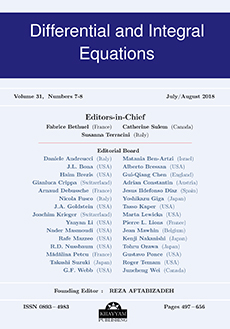Abstract
In this paper we study the Cauchy problem $$ u_t = \Delta u^m-u^m \ \hbox{ in } \mathbb R^N\times (0,\infty) , $$ $u(x,0) = u_0(x),$ with $\frac{N-2}{N} < m < 1$ and $N\ge 2$. If $u_0 \not\equiv 0$ is a non-negative, compactly supported function such that and $u_0^m \in H^1(\mathbb R^N)\cap L^\infty(\mathbb R^N)$, then the solution $u$ vanishes identically after a least finite time $T>0$. We prove the asymptotic formula $$ u(x,t) \sim (1-m)^{1\over 1-m} (T-t)^{1 \over 1-m}w_*^m (|x-\bar x| ) $$ as $t\uparrow T$, for certain uniquely determined $\bar x\in \mathbb R^N$. Here $w_*$ is the unique positive radial solution of $$\Delta w- w + w^p =0 \ \hbox{ in } \mathbb R^N , $$ $$ w(x)\to 0 \hbox{ as } |x|\to \infty , $$ where $p= 1/m$.
Citation
Mariel Sáez. Manuel del Pino. "Asymptotic description of vanishing in a fast-diffusion equation with absorption." Differential Integral Equations 15 (8) 1009 - 1023, 2002. https://doi.org/10.57262/die/1356060782
Information





